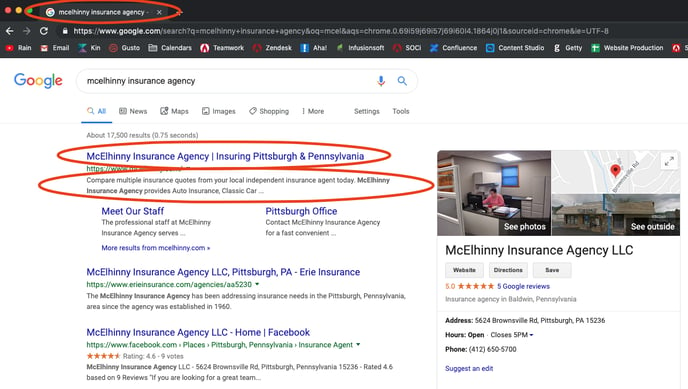How BrightFire Manages Titles & Meta Descriptions
Overview
BrightFire optimizes all of the titles and meta descriptions on your website for both search engines and individuals searching the web. We take great care to ensure that this content performs to the best of its ability, but we also want our customers to understand the reasoning behind our choices.
Understanding Website Grading Tools
Depending on which online resource you reference, or which website grading tool you choose to use, you’ll encounter differing best practices and recommendations. This includes but is not limited to the minimum and maximum length requirements for titles and meta descriptions, as well as their content. At BrightFire, we’ve poured countless hours of research into how to best manage titles and meta descriptions for our customers.
Our best practice is to strike what we deem as a great balance between the recommended length, without sacrificing the quality of the content within titles and meta descriptions. There is no hard evidence that having a title or meta description that is “too short” or “too long” has any negative impact on your website’s SEO.
Google Can Override the Provided Title and Meta Description
Google’s automated algorithms inspect the titles and meta descriptions of every webpage they index. In some cases, their algorithm will discard the title or meta description on a webpage in lieu of what their algorithm deems a better title or meta description. In this case, the title and meta description displayed in Google search results for that particular webpage will not be the title and meta description coded into the webpage. These types of changes are generally made when the logic within their algorithms deem the title or meta description of a webpage as not being descriptive enough about the content of that webpage.
This further complicates relying on website grading tools, since the title and meta description a website grading tool reports on are the title and meta descriptions coded into your website, while Google may have discarded the provided title or meta description of particular webpages in lieu of what their algorithm deems more appropriate.
Ongoing Management
Through continual research and testing, we strive to give Google the best possible information about your agency and follow their guidelines closely. We periodically review how we handle titles and meta descriptions, and make updates to them in order to keep up with Google’s ever-changing best practices.
You can rest easy knowing that your titles and meta descriptions are properly formatted for optimal engagement. If you have further questions regarding the titles and meta descriptions on your website, please submit a new ticket through our support ticketing system.
When new content is published to your website, it is important to have a proper title and meta description. In addition to letting a reader know what to expect from a piece of content, these two elements play a big role in bringing viewers to a page in the first place.

Why Are Titles Important?
In addition to the obvious job of introducing an article or other webpage, titles help potential customers before they even come to your website. For example, the title of a page will appear as the name of the listing when somebody searches for your webpage using Google. The same is true for individual tabs. Since many people open multiple tabs at once when they use the internet, assigning a proper title to each page is crucial to helping people know which tab is your website.
Titles that are too short won’t properly convey what the page is about, while titles that are too long can get cut off in search results. You can rest easy knowing that BrightFire has properly formatted your titles for optimal engagement.
Why Are Meta Descriptions Important?
A meta description is a short snippet of text that appears after a title on the results page of a search engine. This text acts as a preview of the webpage as a whole, so it can have a big impact on a website’s clickthrough rate when used properly.
Although meta descriptions do not impact search engine optimization (SEO), they are still a useful tool for people who are searching for your website’s content. Shorter descriptions usually don’t convey enough necessary information, and longer descriptions will get cut off by search engines. In other words, a longer description won’t hurt your SEO; it just won’t all display due to the limited amount of space.
Finally, it is worth noting that search engines will occasionally override your meta description with one that they generate. This is not because your original text was in violation of any rules, but rather because the search engine felt that your description was either insufficient for a person’s search or not a good overall depiction of the page. When this happens, just like with pages that don’t have any meta text at all, the search engine’s algorithms will automatically generate a new meta description from the beginning of the text on the page itself.
What Does All Of This Mean For Me?
BrightFire already optimizes all of your titles and meta descriptions, so there is no need to worry about the current state of your website. We take great care to ensure that this content performs to the best of its ability, but we also want our customers to understand the reasoning behind our choices. If you have further questions regarding the titles and meta descriptions on your website, please submit a new ticket through our support ticketing system.
